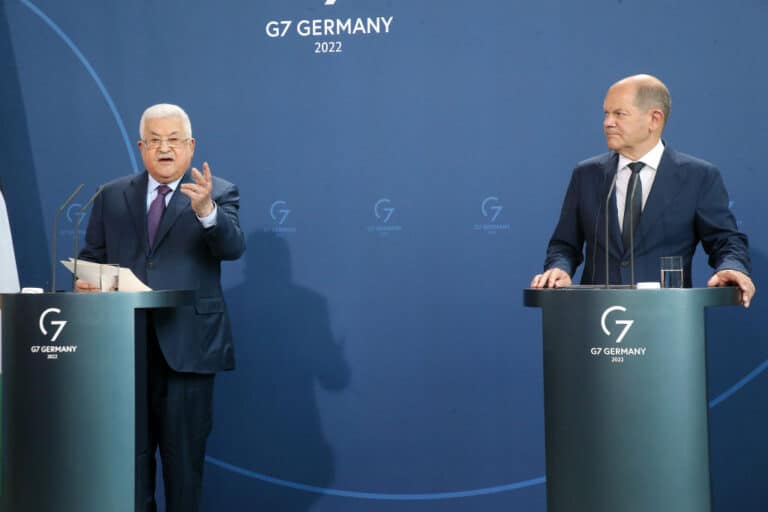
We’re curious…
German police officially opened an investigation into Palestinian President Mahmoud Abbas over his comments made last week that Israel had committed “50 Holocausts” against Palestinians.
Abbas made the comparison during a news conference in Berlin alongside German Chancellor Olaf Scholz while responding to a question on the upcoming anniversary of the Munich Olympics massacre.
“From 1947 until today, Israel has committed 50 massacres in 50 Palestinian villages,” he said. “Fifty slaughters. Fifty Holocausts.”
Downplaying the Holocaust is a criminal offense in Germany, and the German government and the international community quickly condemned the claims.
“I am disgusted by the outrageous remarks made by Palestinian President Mahmoud Abbas,” Scholz wrote on Twitter. “For us Germans in particular, any relativization of the singularity of the Holocaust is intolerable and unacceptable. I condemn any attempt to deny the crimes of the Holocaust.”
Ich bin zutiefst empört über die unsäglichen Aussagen des palästinensischen Präsidenten Mahmoud #Abbas. Gerade für uns Deutsche ist jegliche Relativierung des Holocaust unerträglich und inakzeptabel. Ich verurteile jeden Versuch, die Verbrechen des Holocaust zu leugnen.
— Bundeskanzler Olaf Scholz (@Bundeskanzler) August 17, 2022
The statement was also quickly condemned by Israeli Prime Minister Yair Lapid.
Mahmoud Abbas accusing Israel of having committed "50 Holocausts" while standing on German soil is not only a moral disgrace, but a monstrous lie.
— יאיר לפיד – Yair Lapid (@yairlapid) August 16, 2022
Six million Jews were murdered in the Holocaust, including one and a half million Jewish children.
History will never forgive him.
Abbas appeared to walk back his words a day later, with his office issuing a statement reading:
“President Mahmoud Abbas reaffirms that the Holocaust is the most heinous crime in modern human history.” Adding, “his answer was not intended to deny the singularity of the Holocaust that occurred in the last century, and condemning it in the strongest terms.”
It’s highly unlikely that Abbas will face any charges in Germany as he was traveling there on official diplomatic business.
In the wake of the controversial statement made by Abbas, we wanted to take a look at his past statements and how Israeli prime ministers have approached holding talks with him due to his habit of making controversial statements.
Munich Massacre
But first, Abbas was responding to a reporter’s question about the upcoming 50th anniversary of the Munich massacre. On September 5, 1972, members of the Black September Organization (BSO) — a militant faction of Fatah, the political party Abbas is a member of — took hostages of the Israeli Olympic team at the Olympic Village. When the attack was over, 11 Israelis were dead.
In his autobiography, the architect and mastermind of the Munich massacre, Mohammed Oudeh (also known as Abu Daoud), named Abbas as one of the three senior Fatah officials who assisted him in the planning of the attack.
Daoud wrote that Abbas provided funds for Munich: “Though he claims he didn’t know what the money was being spent for, longtime Fatah official Mahmoud Abbas, aka Abu Mazen, was responsible for the financing of the Munich attack.”
In Berlin, Abbas was asked whether as the Palestinian leader he planned to apologize to Israel and Germany for the attack ahead of the anniversary.
“If we want to go over the past, go ahead,” Abbas told the reporter before going on to make the Holocaust comparisons.
Germany is facing growing criticism in Israel for its handling of the 50th anniversary of the massacre. Most of the victims’ families are boycotting the ceremony because of the amount of compensation Germany offered the victims, and because of the country’s slowness to accept responsibility for the attack, and now inviting Abbas to visit ahead of the date seems to have added insult to injury.
“I think it was very insensitive for the Germans to do” — to receive Abbas so close to the anniversary, international relations expert at Tel Aviv University Emmanuel Navon told the Jerusalem Post.
“I think [that] because of what he said about Holocaust, people paid attention to that, and it killed focus on his refusal to condemn the [Munich massacre],” Navon added.
History of Holocaust denial
This is not the only time Abbas has made controversial statements regarding the Holocaust. In 1984 he published a book titled “The Other Side: The Secret Relationship Between Nazism and Zionism.” In the book, Abbas makes the baseless claim that Zionists manufactured the Holocaust in order to promote immigration to Israel.
“We find that Zionists believe in the purity of the Jewish race, as Hitler believed in the purity of the Aryan race. Zionism calls to find a fundamental final solution to the Jewish question in Europe by immigration to Palestine. Hitler also called for this and implemented it,” he wrote.
“Anti-Semitism is persecution and oppression, and this is definitely something desirable to the Zionist movement.”
“The Other Side” also questions the official death toll of 6 million Jews in the Holocaust. To this day, Abbas has not retracted the book; in fact, it is promoted on the official Palestinian presidency website.
Meanwhile in 2018, during a televised speech, Abbas said that European Jews were killed in the Holocaust because of their money lending activities and not because of antisemitism.
“So the Jewish question that was widespread throughout Europe was not against their religion but against their social function which relates to usury [unscrupulous money-lending] and banking and such,” he said.
The Palestinian president again recited the most contemptible anti-Semitic canards. Apparently the Holocaust denier is still a Holocaust denier. I call on the international community to condemn his severe anti-Semitism; the time has come for it to pass from the world.
— Benjamin Netanyahu (@netanyahu) May 2, 2018
Prime Minister Benjamin Netanyahu condemned the speech, tweeting, “Apparently the Holocaust denier is still a Holocaust denier.”
Meetings with Abbas
At 87 years old, Abbas has been president of the Palestinian National Authority since 2005. He was elected to the position following the death of Yaseer Arafat (there have not been any presidential elections since then).
There have been five prime ministers in Israel since Abbas took office, and he has met with three of them: Ariel Sharon, Ehud Olmert and Benjamin Netanyahu.
“Mahmoud Abbas is a very qualified gentleman, a decent, peace-loving person. I like him, I trust him, I would’ve made peace with him,” Olmert said in an interview in 2021. “Unfortunately, it didn’t work out for reasons that are beyond my comprehension, sometimes. I can’t talk for him.”
However, relations between the two sides soured dramatically while Prime Minister Benjamin Netanyahu was in office.
In 2010 Netanyahu reportedly floated the idea of meeting every two weeks with Abbas in order to restart the stalled peace process. In September of that same year, the two met in Egypt for talks, but nothing developed from them.
It would take another five years for the two to meet again. At an icy photo-op during the Paris Accords, the United Nations conference on climate change, both sides were quick to point out that it was a chance encounter and that the photo was merely a “formality.”
A year later, there was a lot of speculation following a handshake between the two at the funeral of Shimon Peres with both sides calling the meeting a “long time coming.” However, it was a short lived moment. After that, official meetings with Abbas and senior Israeli political leadership became rarer and rarer occurrences as the conflict continued to escalate.
For his part, Prime Minister Yair Lapid has said that he is in no rush to hold meetings with Abbas, which appears to be a continuation of Israel’s defacto policy toward the Palestinian leader.
“I do not have meetings for the sake of meetings unless they have a positive result for Israel,” Lapid told French officials during a visit to the country in July. “At the moment it is not on the agenda, but I do not rule it out.”
Two days after making those comments to the French, Lapid actually called Abbas, the first phone call of its kind between an Israeli prime minister and Palestinian leadership in five years. Nothing of importance was reportedly discussed, with a short statement from Lapid’s office saying the two “spoke about the continuation of cooperation and the need to ensure quiet and calm.”
Despite this, Israeli Defense Minister Benny Gantz has held face-to-face meetings with Abbas twice in recent months, including hosting the Palestinian leader at his residence (the first visit of its kind since 2010), and during a visit to the West Bank.
Israeli officials said the meetings focused on security coordination and efforts to improve the economic situation of Palestinians and nothing about the peace process was discussed.
The in-person meetings have been condemned by political rivals. In a statement, the opposition party Likud said: “The Israeli-Palestinian government has put the Palestinians and Abbas back on the agenda … it is dangerous for Israel,” adding that “concessions dangerous for Israel’s security were only a matter of time.”
The Religious Zionist Party also condemned the meetings, saying that “a decade after the Right succeeded in making Abbas irrelevant and persona non grata around the world and taking off the international agenda the dividing of the Land of Israel and the formation of a terror state, Bennett and his left-wing government are returning Abbas to center stage.”
Former Prime Minister Naftali Bennett used the Germany incident as proof for why he refused to sit down with Abbas or “advance any sort of diplomatic negotiations, even when facing pressure from within and outside Israel” during his 12-month tenure.
“A ‘partner’ who denies the Holocaust, pursues our soldiers in The Hague and pays stipends to terrorists is not a partner,” Bennett tweeted.
Originally Published Aug 23, 2022 12:02AM EDT
